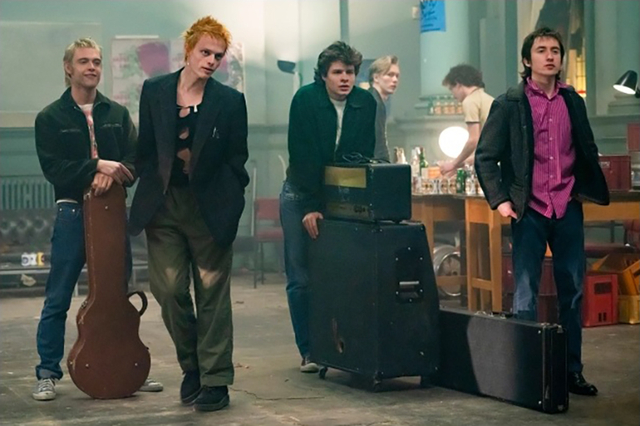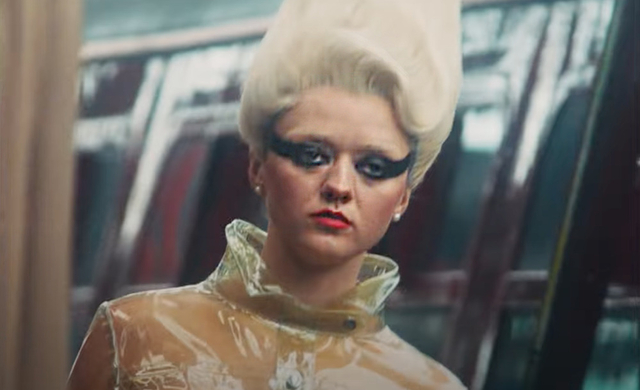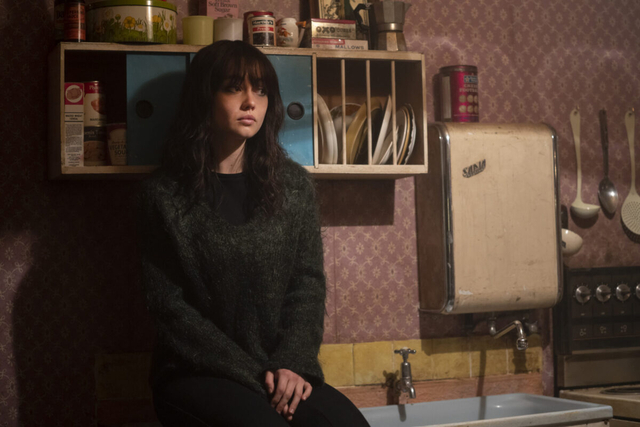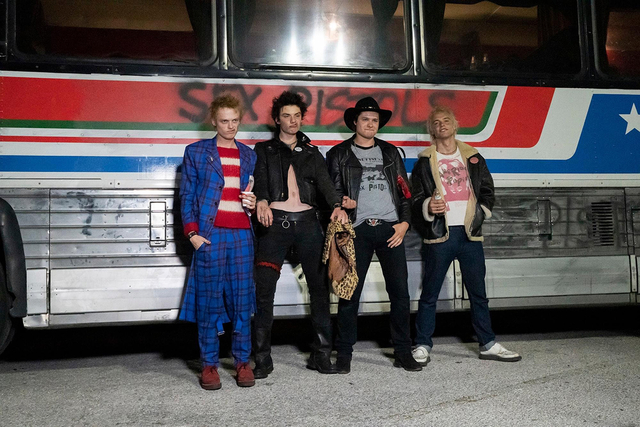It's inevitable that, sooner or later, some pivotal moment in your life – a cultural or political event that changed what you did or thought – will become history. In that moment you realize not just that (a lot of) time has passed, but that your memory of that moment is wholly subjective, and open to interpretation – or misinterpretation. In my young life, that moment was punk rock, and I was naïve enough to believe for years that it was a wholly subcultural event, and hardly likely one day to become a six-part miniseries streamed by Disney. (If I even knew what streaming was.)
Actually, it became obvious that punk rock was going to be perennial content fodder years ago, somewhere between the release of Sid and Nancy (1986) and CBGB (2013), two disappointing attempts to tell the story of people and places crucial to punk history. They set the bar pretty low, and I didn't expect much until I heard that Danny Boyle (Trainspotting, 28 Days Later, Slumdog Millionaire, Yesterday) would be directing Pistol, a series based on the memoirs of Sex Pistols guitarist Steve Jones; the source material was novel, and the director certainly had the credentials to transcend mere ripped t-shirt costume melodrama.
Five minutes into watching the first episode, I heard a voice in my head. It was my friend Kathy Shaidle, author of this column until her death from cancer a year and a half ago. "That's one of the worst things about being dead," she seemed to say.
"I would have loved to have written about this," Kathy told me. "I can't believe they cast the kid from Love, Actually to play Malcolm McLaren. I was going to say that it makes me feel old but, you know, think about that for a second." (I had planned on writing about a spaghetti western this week, but changed my plans at the last minute, as I'll do anything that will make it feel like Kathy is still around.)
The series begins in the summer of 1973, with young Steve Jones (Toby Wallace) stealing equipment from the stage of London's Hammersmith Odeon, where David Bowie and his group are about to say goodbye to his Ziggy Stardust alter ego. Jones is a fan, but that doesn't mean that Bowie's gear – or anyone's – is exempt from his compulsive thieving. Jones' pilferage is meant to equip his own band, whose name, as he proclaims to bandmates Paul Cook (Jacob Slater), Glen Matlock (Christian Lees) and the luckless Wally Nightingale (Dylan Llewellyn), is being changed from The Strand to The Swankers.
Jones really did steal from Bowie – it's one of the foundational myths of the Sex Pistols and punk in general. But he didn't act alone, and it was from trucks outside the Odeon and not the stage – at least if you believe the story Jones himself told until just recently. This is the sort of creative license you'd expect from any biopic or docudrama, and it does nothing to detract from the whole narrative, but you have to keep it in mind with every scene in Pistol, especially when they're (suspiciously) dramatically satisfying.
The Pistols story told through Jones' eyes is an unusual perspective – like the Gunfight at the O.K. Corral told by Virgil Earp, or the Great Train Robbery through the eyes of the locomotive engineer. The narrative since the band broke up is mainly the conflict between John "Johnny Rotten" Lydon and manager McLaren, ultimately fought over the corpse of Sid Vicious. Shifting the perspective slightly stage left unsettles over four decades of cherished myths, and in the hands of Boyle and screenwriter Craig Pearce (Strictly Ballroom, Moulin Rouge!) opens the story up to include characters either overlooked or excluded.
The first thing it does is mute the years of bad blood between Lydon and McLaren and pin London's simmering punk revolution in place at SEX, the King's Road clothing store run by Vivienne Westwood (Talulah Riley) and her boyfriend, McLaren (Thomas Brodie-Sangster). Along with a tiny handful of other shops and pubs, it was where all the players involved in the capital's subsequent events congregated, and the moment of genesis – in Pistol at least – is Jones getting caught shoplifting a pair of trousers by shop assistant Chrissie Hynde (Sydney Chandler), an American who moved to London from Ohio hoping to join a band.

Whether by accident or design, it brings Jones to the attention of McLaren, who the young thief is desperate to have manage the Swankers. Westwood and McLaren – for what prove to be very different reasons – are trying to engineer a youthful revolt against the dreariness and political quagmire of '70s Britain, and imagine a working class rock band being their vanguard. What that band should look or sound like is a matter of debate, but Jones is eager to offer himself and his friends up to the experiment.
The whole first episode details just how ill-suited Jones was to a career in music – or anything, really, except crime. The product of a broken home, abused (verbally and sexually) by his stepfather, and effectively illiterate, Steve Jones was exactly the sort of surplus youth destined to be marginalized or ignored by the mechanism of Britain's educational institutions and welfare state until he did enough to attract the attention of its police and penal systems. McLaren and Westwood consider him their perfect proxy culture warrior for at least a week or two, until it becomes obvious that he lacks the charisma or talent to be a front man.
We don't meet John Lydon until the last shot of the first episode. And before we even hear him speak a word, we're introduced to Pamela "Jordan" Rooke in the pre-credit sequence of "Rotten", the second episode. Played by Maisie Williams (Game of Thrones), Jordan is a true British eccentric, riding on her bicycle through Seaford, East Sussex, in a pair of rubber stockings, topless under a clear plastic raincoat, bleach blonde hair teased into a flame-like beehive, her eyes thickly ringed with mascara.

Jordan, who died earlier this year, would be the most famous employee at SEX, commuting two hours each day to the shop, where she commanded the attention of customers and passersby with her provocative look, which married fetish gear to the charity shop and evoked the headmistress and the nursing sister – female authority figures with enormous sexual charge in England. (There have been plenty of essayists over the years who've imagined Westwood, Jordan and Margaret Thatcher as flip sides of the same coin circulating in British culture at the time – aggressive women who answered the not-so-secret fantasies of men wanting to be dominated.)
Probably the most interesting thing about Pistol is how it reminds us that, before there were records to buy or gigs outside of London, punk was consumed entirely within mass media, where women like Jordan, Susan "Soo Catwoman" Lucas, Susan "Siouxsie Sioux" Ballion and Helen "Helen of Troy" Wellington-Lloyd were lightning rods for the attention not just of the press but violent assaults in the street.
A scruffy-looking young man with safety pins and provocative phrases drawn on his clothes was easier to ignore than a young woman walking the high street in rubber underwear, with hair and makeup more suitable to science fiction or horror films. As soon as punk became about bands and labels and records and sales charts, these young women had to fight to remain visible in the scene, and most (with the exception of Siouxsie, frontwoman of the Banshees, her musical career lasting decades) would subside into mere photo captions.
But for at least the first two episodes of Pistol, that moment is in the future, and Jordan informs Jones when he meets her at SEX that "This is a vulva power revolution."
"Why take the train if you have a Volvo?" Jones asks, innocently.

As Jones made plain in Lonely Boy, the memoir that forms the basis of Pistol, he was defined as a young man not just by his dyslexia and thieving but with a rampant sexual addiction; the young Jones would sleep with anyone, including his friends' girlfriends (and including Nancy Spungen, the American groupie whose relationship with John "Sid Vicious" Beverley, the Pistols' luckless, talentless bassist after Matlock was kicked out of the group, would prove the undoing of the couple.)
A shameless male slattern is a tedious thing, so the makers of Pistol ramp up Jones' affair with Chrissie Hynde – which happened, according to both Jones and Hynde, though nowhere near as ardent or pivotal in real life. Their relationship is the closest thing Pistol has to an emotional centre, and when the pair aren't athletically copulating Hynde is teaching Jones how to become a real musician, after the young man takes speed for a week to teach himself how to play the two chords in the Stooges' proto-punk classic "No Fun."
To fill out the relationship between Jones and Hynde, Pistol incorporates other women from the scene, prime among them Viv Albertine, guitarist in the all-girl punk band The Slits. Albertine, like Hynde, was an aspiring musician who rehearsed with future members of the Clash and Generation X. Like Hynde she never made it onstage until she formed her own band, and the complete absence of Albertine and the Slits from Pistol is one of the series' most glaring omissions. (I know Kathy would notice it, and not without rancor.)

Sydney Chandler's Hynde is being described as one of the breakout performances in Pistol. She's certainly allowed to be one of the more sane people in a story populated by youthful lunatics, though I found it hard to see the resemblance between Pistol's Hynde and the swaggering rock star I overheard telling obscene stories in the dressing room at Toronto's El Mocambo club in the late '80s, paying a visit on friends in a band while her group, The Pretenders, were headlining Maple Leaf Gardens down the street. Like nearly every other major character in Pistol, Chandler's Hynde is younger and better-looking than her real-life counterpart.
But the most creative enhancement of a female role in Pistol is in the third episode, "Bodies," where the band overcome their mutual antipathy and realize their creative potential after John Lydon (Anson Boon) replaces Jones as the lead singer. Just as "Rotten" introduced us to Jordan, "Bodies" begins with the story of Pauline (Bianca Stephens), a schizophrenic young woman who escapes institutionalization in Birmingham and ends up at an early Pistols gig. By this point the band are still playing mostly covers, as Lydon complains that they're musically unworthy of his lyrics.
Pistol has Pauline cut a painful line through the Pistols' world, first appearing at SEX, where she unsettles Jordan and traumatizes Westwood when they discover that she's carrying her aborted fetus around in her bag. She disturbs Jones next, as he discovers the infant's corpse during a fumbling attempt at sex in his Mini, and she finally visits Lydon, who had been avoiding her. He listens to her story and sees the baby, which inspires him to write the song "Bodies," probably the most powerful and ferocious song the band ever performed, and still a touchstone for debates about whether Lydon intended it as a pro-life or pro-choice message.
Pauline was real, according to Lydon and Jones, though Pistol creates a compelling fantasy with the bare bones of her story, imagining her as a real victim of the system, more actually oppressed than any of the budding punks. Boyle's invention is highlighted when, after Lydon begs Pauline to give her baby a decent burial, she's seen crossing Waterloo Bridge to find a spot on the Thames foreshore. The location begs the viewer to recall the 1940 drama of the same name, starring Vivien Leigh and telling a story about young women driven to prostitution and suicide.

You can't blame Boyle for his ambition; there's something inherently silly about a project like Pistol, which hinges on performance scenes where the actors are essentially doing karaoke, and any creative invention that distracts from this fact is not just welcome but essential. The lightning rod for any criticism of Pistol is, of course, the figure of Lydon and the performance of Anson Boon, who does a more than decent job with the thankless task of portraying one of the most iconic front men in the history of rock and roll.
Pistol is shot in academy ratio, not widescreen - like an old movie cut for television, and through diffusion filters that reduce the resolution and make it look like a copy of a copy. But when it comes time to depict an event in punk history that was filmed and re-shown endlessly in documentaries – the Pistols' first televised appearance on Granada's So It Goes; the band's infamous interview on the Bill Grundy show; Siouxsie and the Banshees' gig at the 100 Club; the "God Save the Queen" video filmed just after Vicious joined the band – Boyle's camera and the art direction impeccably recreate the moment, almost shot for shot.
And in this setting Boon's Lydon can't help but look like a pantomime performance, as Lydon himself has complained. Boon nails Lydon's voice and accent and manages several electrifying scenes, such as the one where he auditions for the band, singing to Alice Cooper's "Eighteen" in front of the jukebox at SEX. But any attempt to fill in the larger-than-life figure Lydon was at pains to create is bound to seem hypertrophied.

Ultimately, even if you're not me (or Kathy), it's hard not to regard Pistol as a nostalgia exercise, a period film as mannered as a Jane Austen adaptation. For me at least, it's a record of one of the last moments where it seemed like cultural rebellion was possible – though as time would reveal, that was an illusion, and perhaps a necessary one.
Even before he meets McLaren and Westwood, Jones' ambition for his band is imagined as class rebellion – a chance for the powerless to be heard, and perhaps lunge for a bit of fame and fortune. He knows he doesn't stand a chance without someone like McLaren behind him, to help navigate around the invisible barriers he could never see, and to cloak that lunge in language that the media and corporate worlds can understand.
It's a sales job, and while McLaren eagerly becomes their salesman, Westwood is more intent on the Sex Pistols helping sell not just her clothes but her worldview. He's more than a bit of an obvious fraud – a poseur and a "tosser", camply calling the band his "sexy young assassins" – but Westwood sounds more serious.

In a scene where the couple talk about "brands" – a concept that I'm not sure was in general use in the mid- to late-'70s – Vivienne makes fun of what she considers his trite ambition for the band, which amounts to being little more than an updated Brian Epstein.
"My idea of ambition," Westwood proclaims, "is to be the new Boadicea. I want to ride a chariot down Oxford Street and burn this whole city to the ground."
Despite a few creditable efforts in the interim, London is still there, and Westwood became Dame Vivienne Westwood OBE in 2006. In 2011 Princess Eugenie wore three of Westwood's outfits at her wedding and at that of her cousin Prince William to Catherine Middleton. Her "Tits" t-shirt, a must-have item of punk clothing, worn by Jones on the Grundy show and by Toby Wallace in Pistol, is in the collection of New York's Metropolitan Museum of Art.
The last half of Pistol is the stagger to the band's finish line, a wholly unedifying spectacle at the time that left Vicious and Spungen dead, McLaren flogging the scraps like a carnival barker, Lydon estranged from the band and lawyers hard at work on lawsuits for decades to come. They were back at it again while Pistol was in production, when Lydon tried to block use of Pistols music in the series.
The latest Pistols court battle painted Lydon as the bad guy, who was happy to turn down not just his royalties but those of his bandmates because of an ancient grudge. Malcolm McLaren might be dead, but John Lydon is still fighting to control his image, long after he lost it when Johnny Rotten and Sid Vicious became media caricatures – the latter with his own active connivance, the former with increasing and apparently unceasing regret.
With the end of the Pistols, Lydon was fighting for acknowledgment of his authorship – of "Bodies" and Never Mind the Bollocks and his own alter ego – and for his financial stake in that creation. Today he's fighting so that when people imagine Johnny Rotten they might actually see John Lydon and not a gurning, glaring Anson Boon doing what Lydon can't help but consider a parody. You can't blame him for trying, though it's likely he lost that battle the day after he said "shit" on the Bill Grundy show.
Mark Steyn Club members can let Rick know what they think by logging in and sharing in the comments below, as access to the comments section is one of many benefits that comes along with membership in the Mark Steyn Club.






















